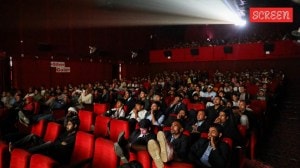Google Glass not out yet,and already banned
While explorers crack the limits of Google Glass,critics argue over the boundaries for technology
David Streitfeld
Googles wearable computer,the most anticipated piece of electronic wizardry since the iPad and iPhone,will not go on sale for many months. But the critics are already in a lather.
The glasses like device,which allows users to access the Internet,take photos and film short snippets,has been pre-emptively banned by a Seattle bar. Large parts of Las Vegas will not welcome wearers. West Virginia legislators tried to make it illegal to use the gadget,known as Google Glass,while driving.
This is just the beginning, said Timothy Toohey,a Los Angeles lawyer.
As personal technology becomes increasingly invisible,Glass is prompting questions of whether it will distract drivers,upend relationships and,above all,strip people of what little privacy they still have in public.
A pair of lens-less frames with a tiny computer attached to the right earpiece,Glass is promoted by Google as seamless and empowering. It will have the ability to capture any chance encounter,from a celebrity sighting to a grumpy salesclerk,and broadcast it to millions in seconds.
Google stresses that Glass is a work in progress,with test versions now being released to 2,000 developers. Another 8,000 explorers,people handpicked by Google,will soon get a pair.
We are thinking very carefully about how we design Glass because new technology always raises new issues, said Courtney Hohne,a Google spokeswoman.
Developers,however,are already cracking the limits of Glass. One created a small sensation in tech circles last week with a programme that eliminated the need for gestures or voice commands. To snap a picture,all the user needs to do is wink.
The 5 Point Cafe,a Seattle bar,was apparently the first to explicitly ban Glass. In part it was a publicity stunt but the bars owner,Dave Meinert,said there was a serious side. The bar,he said,was kind of a private place.
The legislators in West Virginia were not joking at all. The state banned texting while driving last year but hands-free devices are permitted. That left a loophole for Google Glass. The legislation was introduced too late to gain traction before the most recent session ended,but its sponsor says he is likely to try again.
Glass is arriving just as the courts,privacy advocates,and tech companies are once again arguing over the boundaries of technology in every walk of life.
Google Glass will test the right to privacy versus the First Amendment, said Bradley Shear,a social media expert at George Washington University.
Google has often been at the forefront of privacy issues. In 2004,it began a free email service,making money by generating ads against the content. Privacy groups protested. Regulators were urged to investigate whether eavesdropping laws were being violated.
For better or worse,people got used to the idea. Gmail now has over 425 million users.
More recently,the companys unauthorised data collection during its Street View mapping project prompted investigations in a dozen countries.
Thad Starner,a pioneer of wearable computing who is a technical adviser to the Glass team,says he thinks the concerns are overblown.
Asocial people will be able to find a way to do asocial things, Starner said. He added that he had experimented with Glass-type devices for years,and I cant think of a single instance where something bad has happened.
An incident at a Silicon Valley event shows,however,the way the increasing ease in capturing a moment can lead to problemseven if unintentionally.
Adria Richards,who worked for a Colorado-based email company SendGrid,was offended by the jokes two men were cracking behind her at the PyCon developers conference. She posted a picture of them on Twitter with a reproving comment,Not cool.
One of the men was immediately fired by his employer,PlayHaven. There is another side to this story, he wrote on a hacking site. She smiled while she snapped the pic and sealed my fate, he complained.
Critics lashed out at Richards,using language more offensive than the two men used. SendGrid dismissed Richards,saying there was such an uproar over her conduct,it put our business in danger.
I dont think anyone who was part of what happened that day could have imagined how this issue would have exploded, Richards reflected later. She has not posted on Twitter since.
- 01
- 02
- 03
- 04
- 05































